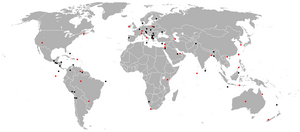New 7 Wonders of Nature (2007–2011) was an initiative started in 2007 to create a list of seven natural wonders chosen by people through a global poll. It was the second in a series of Internet-based polls led by Swiss-born Canadian Bernard Weber[1][2] and organized by the New 7 Wonders Foundation,[3] a Swiss-based foundation which Weber founded. The initiative followed an earlier New 7 Wonders of the World campaign, and attracted 100 million votes from around the world before voting finished on November 11, 2011.[4]

Stages of the campaign
editThe New 7 Wonders of Nature campaign started in 2007, immediately after the campaign to elect the man-made New 7 Wonders of the World, in which more than 100 million votes were cast. From over 440 participants representing over 220 countries and through a national qualification and race to become one of the Top 77, as well as the recommendations of the Panel of Experts led by Prof. Federico Mayor, the list of 28 "Official Finalist Candidates" was determined. Voting until November 2011, during which time the New 7 Wonders World Tour planned to visit each of the finalists to allow them to present themselves to the voters across the globe.[5]
Criticisms
editIndonesia's Vice-Minister for Tourism said the company running the New 7 Wonders campaign used underhanded tactics, threatening to remove Indonesia's Komodo National Park from the list if Indonesia refused to host a declaration ceremony for $35M.[6] Nothing in the New 7 Wonders voting procedure prohibited repetitive voting, making the results subject to government and tourism industry campaigns to vote often for local sites with the financial incentive of increased tourism. Although New 7 Wonders is a non-profit organization that under US law has absolutely no disclosure of accounts, many activities related to administering voting and other logistical duties are run by the for-profit organization New Open World Corporation.
In South Korea, over the past four years, millions of Koreans and non-Koreans at home and abroad were encouraged by the central and Jeju provincial governments to make phone calls to vote and help the island win the designation. Employees of Jeju Special Self-Governing Province of South Korea made hundreds of millions of international phone calls to ensure Jeju island was selected as one of the New 7 Wonders of Nature in a worldwide poll. The payments estimated to be about 20 billion won ($17 million).[7]
Winners
edit| Site(s) | Country/Countries | Image |
|---|---|---|
| Amazon Rainforest and River | Brazil, Bolivia Colombia, Ecuador, French Guiana (France), Guyana, Peru, Suriname, Venezuela | |
| Hạ Long Bay | Vietnam | |
| Jeju Island | South Korea | |
| Iguazú / Iguaçu Falls | Argentina, Brazil, | |
| Puerto Princesa Subterranean River National Park | Philippines | |
| Komodo Island (National Park) | Indonesia | |
| Table Mountain (National Park) | South Africa |
Finalists
editTop 77
editNote. The list contains those eligible who were considered by the experts, the 77 main nominees, minus the 28 finalists, minus the 6 of those who were not eligible due to the rules of participation, that is 43.[8]
See also
editReferences
edit- ^ "The project founder Bernard Weber - A Short History - World of New7Wonders". World of New7Wonders. Archived from the original on 2014-06-06. Retrieved 2013-03-08.
- ^ "The project founder". About New7Wonders. Retrieved 2018-08-26.
- ^ "Learn about New 7 Wonders". World of New 7 Wonders.
- ^ "Voting procedure". World of New7Wonders. Archived from the original on 2013-03-31.
- ^ The top 77
- ^ "Controversy mars Seven Wonders of Nature list". aljazeera.com.
- ^ "Jeju defers payment of phone bills for seven wonders". The Korea Times. December 14, 2011.
- ^ "Top77: New7Wonders of Nature". New7Wonders of Nature. Retrieved 2021-09-28.